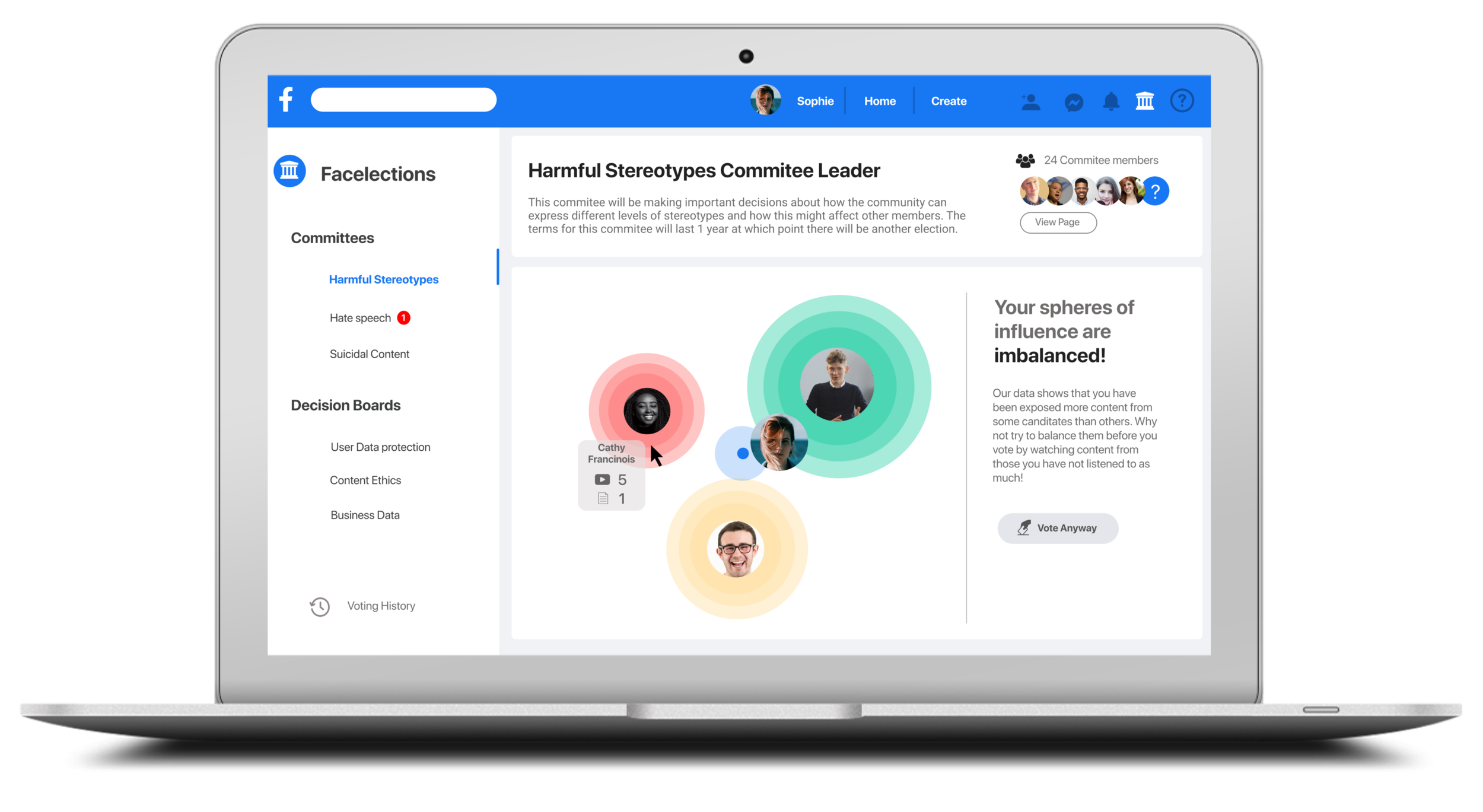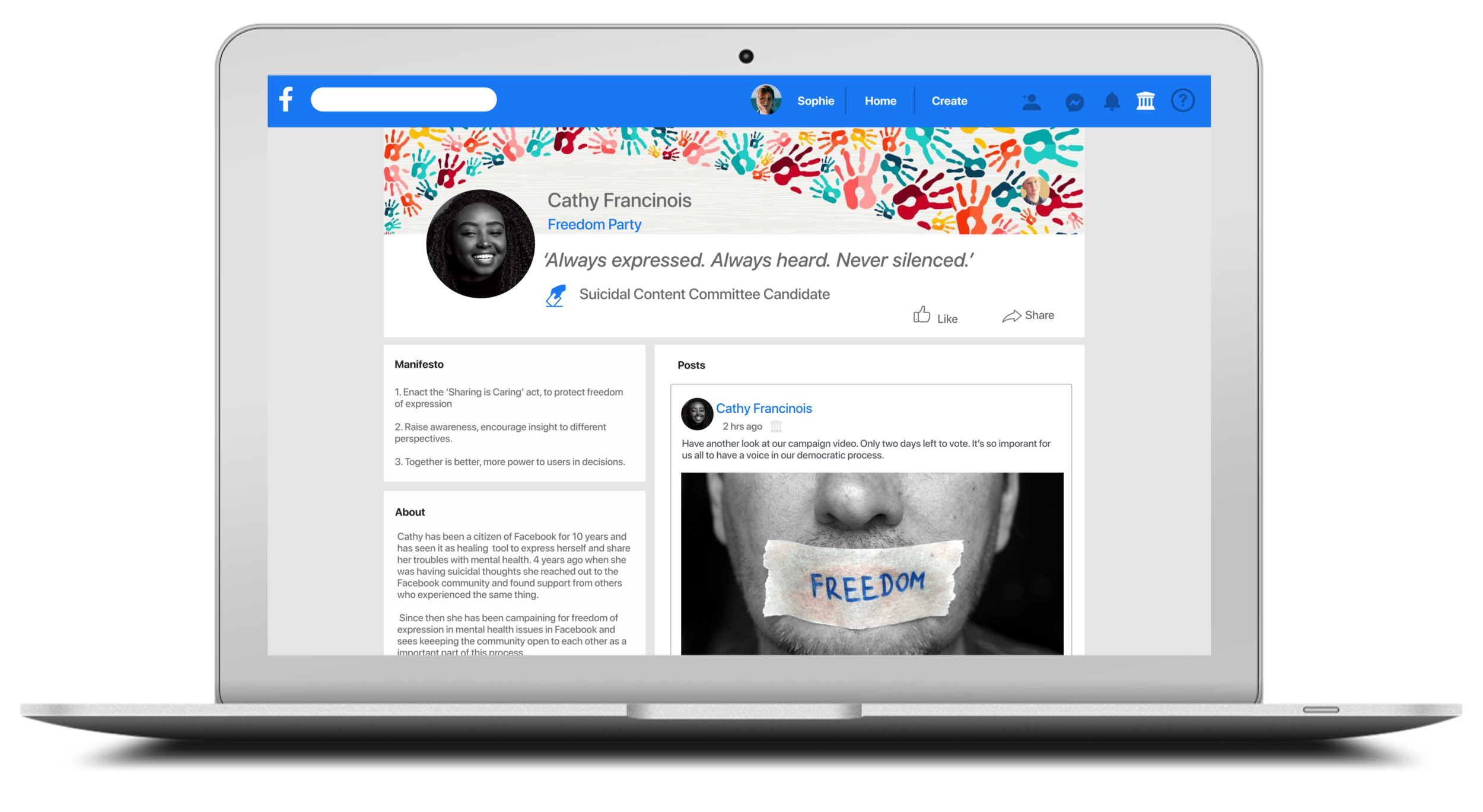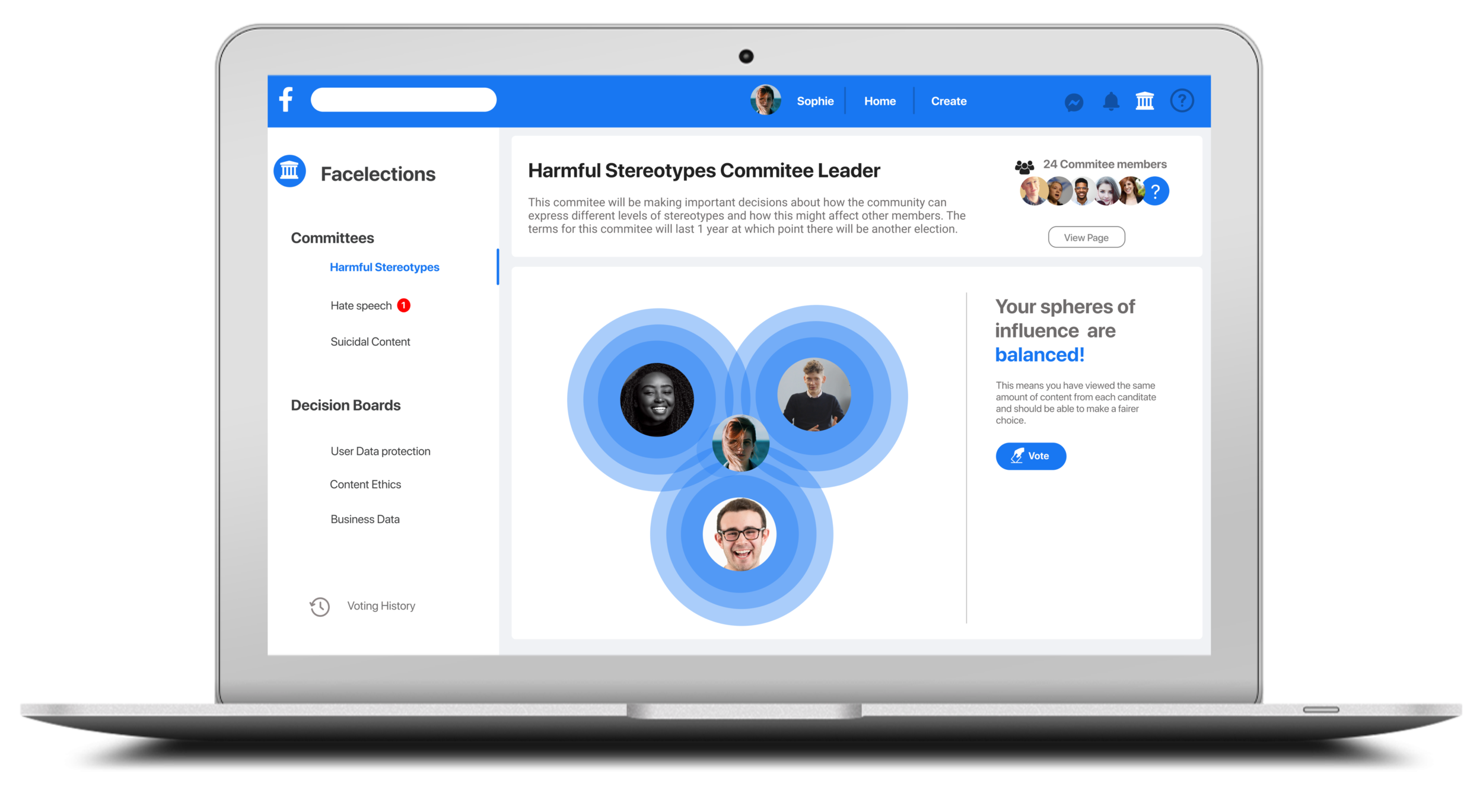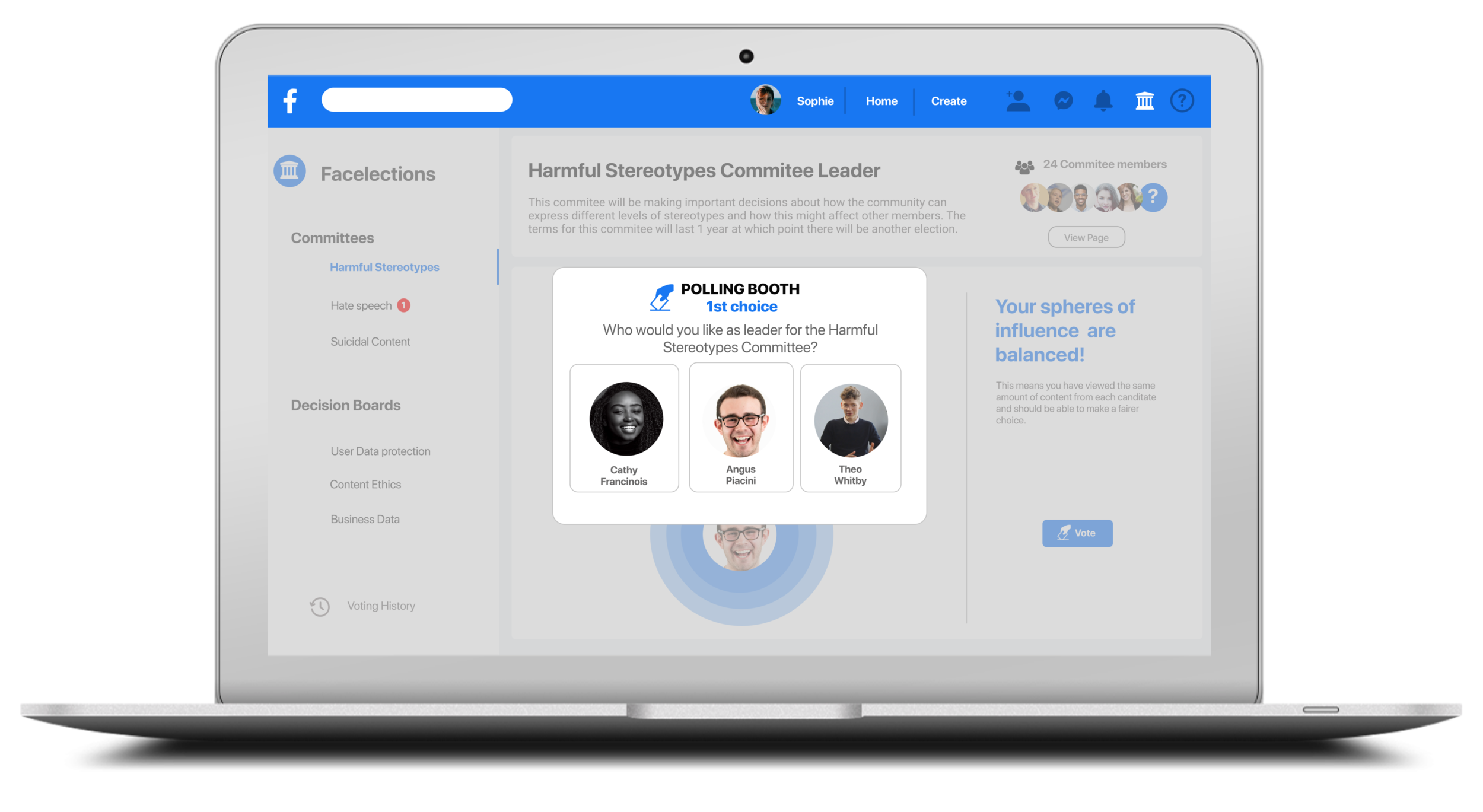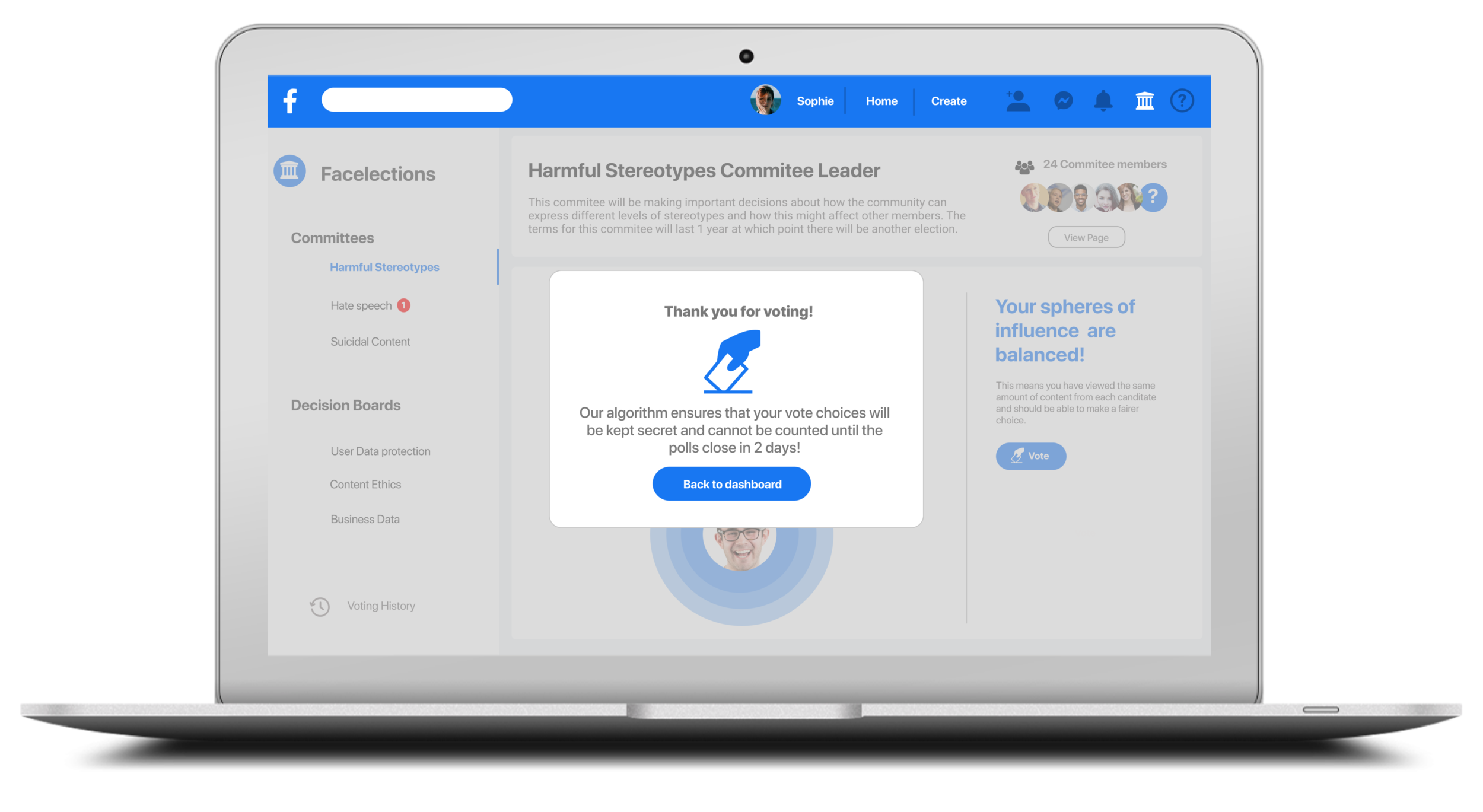FACELECT
EXploring MODELS of Governance in our Digital Nations
2 week individual project within the Fluid Assemblages course at Umeå Institute of Design, November 2019
Skills: speculative design, digital material design, UX/UI,(Figma) generative ideation workshop, co- creation workshop, storytelling
CHallenge
Facebook is a community of people living together in a shared digital space, within their own bubbles of content exposure. But who decides on the rules of that shared space? What if we view Facebook as a nation of citizen users? What kind of government does it have?
Introducing FACELECT
Facelect engages Facebook ‘citizens’ to take part in elections for representatives on different decision making committees within facebook. Voters can reflect on what kind of content they have seen and balance their spheres of influence by catching up with content they might have missed form other candidates before they vote.
“What if users were able to have a voice in shaping the laws of Facebook while reflecting on their own influences?”
WHAT if FACEBOOK WAS A COUNTRY?
In the 18th century our nations were formed, largely based on the geographical spaces we inhabited. Our communities were tied by language and physical proximity. Today, most of us are members of communities in digital spaces. What if we viewed these spaces as nations? What type of countries are they? What kind governments do they have?
As citizens of digital nations, we currently have varying degrees of influence on how these nations develop and evolve. The age we live in calls for different ways of us defining these spaces. Issues of data protection, content moderation and the ethics of how we behave with each other in our digital platforms are currently being decided by those in control of those platforms. Can we turn Facebook’s attention methods to attract interest into its own democratic processes?
Introducing Facelect
The Facelect widget is part of the Facebook interface, and allows users to engage with a dashboard from which they can see which elections are coming up and catch up on candidate campaigns for positions in different committees that make important decisions within Facebook.
Engage With the Digital Democracy
Consume Facelection political content from citizen candidates running for positions within Facebook committees via your newsfeed and friends sharing posts.
Facebook’s usual notification system helps you to engage with the upcoming Facelections for different committees and reminds you to vote in time before the polls close.
REFLECT on Your Spheres of INfluence
Facelect encourages you to burst your bubble and reflect on your content consumption before you vote.
At this stage you can still vote if your spheres are imbalanced but you would be doing so with the knowledge that you may have a biased perspective.
Balance Your Spheres
You can choose to balance your spheres of influence before you vote by checking out political content and perspectives you may have previously missed from other candidates.
VOTE For your Representative
Having pierced your bubble by balancing your spheres, you can vote for your favourite candidates in order of preference based on more balanced content consumption.
To ensure privacy, Facebook’s voting algorithm keeps your vote safe before the polls close.
The FACELECT FLOW
how I got there
““As the shape of political geography and the architecture of planetary-scale computation as a whole, The Stack is an accidental megastructure, one that we are building both deliberately and unwittingly and is in turn building us in its own image.””
EXPLORING FORMS OF GOVERNANCE
In my first workshop I was looking to explore how different forms of governance can be applied to physical objects or digital platforms. I asked participants to use an existing political system and see how it can apply to an physical or digital object and then see how the power dynamics could fit into a voting system for a digital platform like Facebook or Google.
Mapping the governance system and power dynamics around a toilet and mapping it onto Facebook
Tug of war voting system - feel the tangible resistance and influence of your fellow citizens.
Including the Facebook Perspective
For this project I was interested in how to fit democracy in the current model of Facebook. I wanted to offer a solution that could work in line with how Facebook currently views itself as an organisation. Further research into the company gave me interesting insights into what the views its governance structure and how think about how to work around it rather than against it.
Facebook sets its community standards on 3 principles: Safety, Equity and Voice. I found these principles interesting but also conflicting in many ways. For example, what does freedom of voice mean when the content could be damaging or viewed as dangerous?
The principles upon which Facebook bases its community standards
CREATING A CAMPAIGN To GENERATE CONTENT
The different principles were used as stances from which to form political parties that might exist in the Facelection. The stance acted as the cornerstone for the party manifesto and campaign and this was followed by some actual canvassing. Talking to people face to face highlighted the lack of engagement there was with some decisions that are being made within Facebook, but which have an influence on its citizens.
Create your manifesto
2. Create a campaign video
3. Canvass among the people
Create a manifesto that aligns with your stance on 3 topics suicidal content, stereotypes and data autonomy
Create a campaign video for to share with citizens of Facebook outlining your main manifesto points
Engage with people face to face and find out more about their stance on different issues within the Facebook nation.
What I learnt
This project was a new experience in that it began with engaging with the subject through reading and analysing, not through user research. This was a process that as a designer I was not used to and it meant that getting input from workshops to help in my process really helped the flow and direction of where I was going. Confronting such a huge topic as nationalism and even digital governance was daunting but I learnt a lot about how necessary it is for us to find ways to engage people in the back ends of their digital environments. I wanted to find a way to suggest an alternative to how things are run today but also in line with with current identity of an organisation like Facebook in a way that would be familiar to people.




